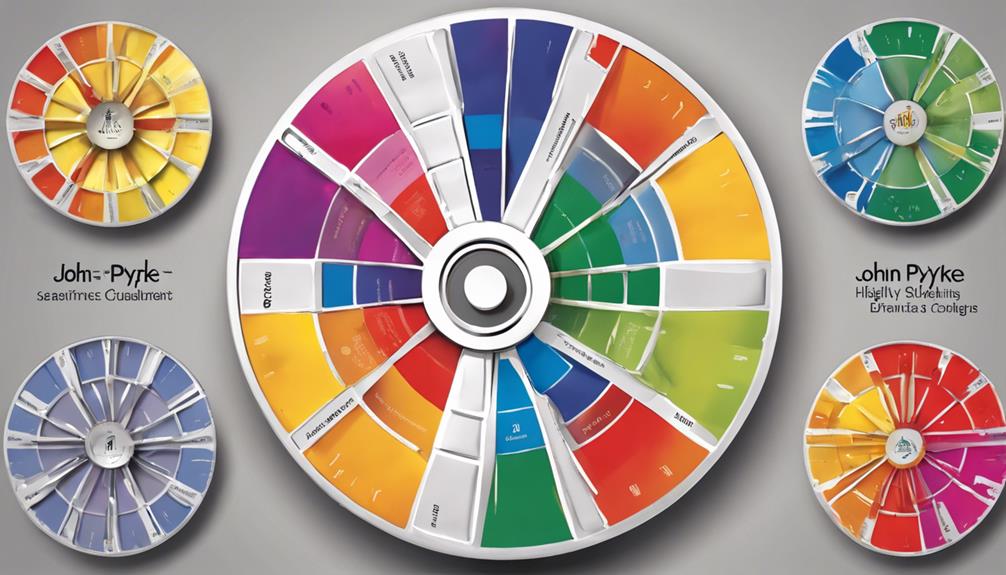In the realm of DISC assessments, there is a common belief: ‘Know thyself.’ But how can we effectively become skilled at utilizing this tool?
Well, let me tell you, it's not just about answering questions; it's about understanding the deeper implications of your responses.
As we dive into this discussion, we will uncover the key strategies that can help us unlock the full potential of a DISC assessment and leverage it for personal and professional growth.
Stay tuned for some insightful tips on navigating this valuable self-discovery journey.
Key Takeaways
- Understand your behavioral style for accurate responses.
- Align answers with genuine self-awareness and honesty.
- Apply insights to enhance communication and relationships.
- Use assessment results for targeted personal growth efforts.
Understanding the Purpose of DISC Assessment
Understanding the purpose of the DiSC assessment is crucial for fostering effective team dynamics and enhancing communication within professional settings.
The DiSC assessment categorizes individuals into Dominance, Influence, Steadiness, and Conscientiousness, aiding in understanding communication preferences and behavioral styles.
By comprehending the essence of the assessment, teams can navigate conflict resolution more effectively, fuel professional development, and improve overall team dynamics.
This tool plays a vital role in enhancing self-awareness and emotional intelligence by shedding light on individual strengths and areas for improvement.
By leveraging the insights gained from the DiSC assessment, individuals can adapt their communication styles to collaborate more efficiently and capitalize on their strengths during team projects.
Embracing the purpose of the DiSC assessment empowers individuals to engage in more meaningful interactions, contribute positively to team endeavors, and ultimately elevate the collective success of the team.
Reflecting on Natural Tendencies

As we ponder our natural tendencies, it's essential to reflect on how we instinctively navigate challenges, conflicts, and collaborative efforts. Here are some key points to consider:
- Evaluate Communication Style: Understanding how we communicate in different situations can provide insights into our behavioral tendencies.
- Recognize Teamwork Preferences: Reflecting on our preferred approach to teamwork and collaboration helps us uncover our innate inclinations.
- Handle Stress and Pressure: Examining how we deal with stress and pressure can reveal valuable information about our natural tendencies.
- Assess Decision-Making Process: Considering our decision-making methods and problem-solving approaches allows us to gain clarity on our instinctive inclinations.
- Identify Consistent Patterns: By recognizing consistent patterns in our responses to challenges and conflicts, we can better understand our natural tendencies.
Reflecting on these aspects can deepen our self-awareness and enhance our ability to master the art of answering a DISC assessment effectively.
Being Honest With Yourself
Being honest with ourselves is essential for gaining accurate insights and fostering genuine self-awareness. When we approach a DISC assessment with honesty, we set the foundation for a more accurate assessment of our behaviors and tendencies. Dishonesty in our responses can lead to skewed results, hindering our personal growth and development. Authenticity in our answers ensures that we receive genuine insights that can serve as a catalyst for self-improvement.
Self-reflection plays a crucial role in this process. By engaging in honest self-reflection, we can better understand our strengths, weaknesses, and areas for improvement. This introspection is vital for achieving a more accurate assessment of ourselves. Embracing honesty in our responses allows us to confront our behaviors with authenticity, leading to a deeper level of self-awareness and a clearer path towards personal growth. In mastering the DISC assessment, being truthful with ourselves is the first step towards unlocking our full potential.
Navigating the Assessment With Confidence

To successfully navigate the DISC assessment with confidence, it's crucial to grasp the underlying purpose of the evaluation and familiarize ourselves with the behavioral styles it measures. Understanding the different styles helps in interpreting the assessment results effectively.
Here are some strategies to assist you in navigating the assessment smoothly:
- Learn the Behavioral Styles: Gain knowledge about the four main behavioral styles – Dominance, Influence, Steadiness, and Conscientiousness.
- Identify Your Style: Recognize your primary and secondary styles to comprehend your DiSC profile better.
- Practice Communication Strategies: Tailor your communication based on the styles of others for enhanced interpersonal skills.
- Stay True to Yourself: Answer honestly to ensure accurate results in your DiSC assessment.
- Strive for Consistency: Maintain consistency in your responses to portray a coherent profile that reflects your true self.
Maximizing Benefits for Growth
Understanding the profound impact of leveraging insights from a DISC assessment is pivotal for unlocking personal and professional growth opportunities. By delving into the nuances of our personality types and those of our team members, we can tailor communication strategies to enhance employee engagement and foster more effective collaborations.
The DiSC styles provide a roadmap for improving interactions and relationships, ultimately leading to a more harmonious and productive work environment. Utilizing the insights gained from a DISC assessment can pinpoint areas for development, guiding targeted efforts towards personal growth and skill enhancement.
Embracing the feedback received through the assessment enables individuals to make informed decisions on how to adapt their communication and behavior to maximize their potential. In essence, harnessing the power of a DISC assessment for growth not only enhances individual performance but also cultivates a culture of continuous development and improvement within organizations.
Frequently Asked Questions
How Should I Answer a Disc Assessment?
When answering a DISC assessment, we should respond honestly, focusing on our behaviors in workplace scenarios. Overthinking should be avoided for authenticity. Consistency in responses is key for accurate profiling, reflecting our true preferences.
What Is the Rarest Personality Type in Disc Assessment?
The rarest personality type in a DiSC assessment is typically the 'C' type, representing Conscientiousness. This type is detail-oriented, analytical, and prioritizes accuracy. Understanding this rarity can provide valuable insights into team dynamics.
How Do You Facilitate a Disc Assessment?
We guide participants through the DiSC assessment with clarity and support, fostering an environment for honest responses. Our role is crucial in ensuring accurate results and aiding personal and professional growth.
Which Disc Personalities Work Best Together?
Understanding which DISC personalities work best together creates harmonious teams. Dominance and Influence excel with leadership and communication. Steadiness and Conscientiousness balance relationships and detail. Pairing D with C combines results and planning. I and S blend social skills with stability.
Are There Effective Strategies for Overcoming Criticism of the DISC Assessment?
Overcoming disc assessment criticism uncovered can be challenging, but it’s possible. One effective strategy is to address the specific concerns raised by critics, providing evidence of the assessment’s validity and reliability. Additionally, offering training and support to those using the assessment can help address any misconceptions or concerns.
Conclusion
In conclusion, mastering the art of answering a DISC assessment is like unlocking a door to self-awareness and personal growth. By understanding our natural tendencies, being honest with ourselves, and navigating the assessment confidently, we can gain valuable insights for development.
So, let's embrace this journey of discovery and use the results as a compass to guide us towards becoming the best version of ourselves.









